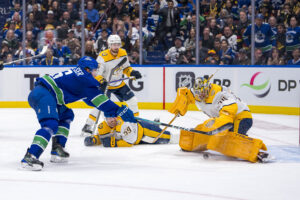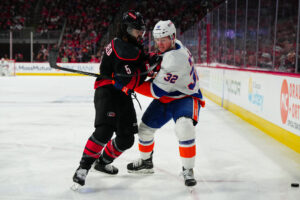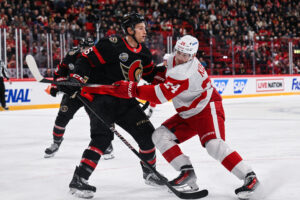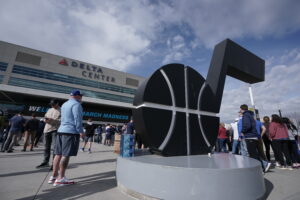Welcome back to Last Word on Sports look at each team’s biggest game in franchise history. In today’s edition, we’ll look at arguably the most undisputed game on our list. While a few months ago, there would have been many arguments about which game to choose, recent history has completely changed that. For the St. Louis Blues biggest game, there’s only one option: Game Seven of the 2019 Stanley Cup Playoffs.
St. Louis Blues Biggest Game
The Dark Times
To say this game was truly incredible would be an understatement. The St. Louis Blues had one of the most storied campaigns in NHL history during the 2018-19 season. Despite making tremendous off-season additions during the 2018 summer, they started the year off in disarray. The team set a 7-9-3 record through their first 19 games. While not a terrible stat-line, it was completely below the level that many fans expected out of a bolstered St. Louis roster. Fans began to quickly lose hope. The players seemed to notice, as morale plummeted.
The drop in morale only led to more issue on the ice. There seemed to be absolutely no chemistry among the team. The terrible on-ice issues were only emphasized by awful coaching from head coach Mike Yeo. Yeo seemed to be completely out of his element, almost blind to the issues that plagued the Blues locker room. Despite clear, fixable mistakes appearing in every game, Yeo continued to make more-and-more of the team’s practices optional. It was even rumored that Yeo was almost a figurehead, simply letting the players debate among themselves instead of taking charge. Only two months into the season and the Blues had completely fallen apart.
Changing of the Guard
A change was needed. As the cracks in the team’s system began to shine through, many Blues fans were quick to call for Yeo’s dismissal. While it was a bit uncalled for at the start, Yeo seemed to make the firing more warranted with each game the team played. The situation in St. Louis continued brewing until, on November 20, general manager Doug Armstrong relieved Yeo of his role as head coach. Armstrong promoted 17-year NHL veteran and, at the time, assistant coach Craig Berube to the role of interim head coach in Yeo’s absence. Armstrong also announced that Hall-of-Fame defenceman Larry Robinson would also join the Blues coaching staff.
Turning Things Around
To many Blues fans, this firing marked a turn-around for the team. Armstrong had replaced the timid Yeo with Berube, a man who made his living as an enforcer in the NHL. While Yeo was undeniably passive, it was clear that Berube wasn’t going to accept any excuses. He wanted to win and he made it evident from the moment he earned the head coach role.
Yet, the team didn’t win. Despite finally inserting an assertive head coach, things continued to fester in St. Louis. They lost six of the next 10 games, following the firing. By the turn of the year, they were comfortably placed among the worst teams in the NHL, with an overall record of 15-18-4. The frustration in St. Louis finally boiled over on December 10, when teammates Zach Sanford and Robert Bortuzzo got into a fight during practice. While many Blues fans knew there was unrest in the locker room, this fight was simply too much to handle. The players were so fed up that they began to physically fight among one another.
With the internal strife, it seemed the writing was on the wall: the Blues were not going to make the playoffs. They were a disgruntled, unorganized group that couldn’t even peacefully associate among one another. The 2018-19 season was a sham. With the trade deadline a little over two months away, there were clearly going to be a lot of changes needed to give the team any sort of hope during the 2019-20 season.
Gloria
Yet, with the new year came a new Blues team. On January 6, the Blues were in Philadelphia for a game the next night against the Philadelphia Flyers. Five members of the team, including Alex Steen and Joel Edmundson, were at a local bar watching the NFL playoffs. Edmundson recounts the atmosphere inside that bar that night, saying, “They had a DJ in the bar and whenever there was a commercial break, they would crank the tunes and all these guys from Philly would get up and start dancing around.”
Of the songs the DJ would play, one came up continuously, ‘Gloria’ by Laura Branigan. Edmundson says that everyone in the bar would collectively sing along to the song every time it came up. It was such an electric atmosphere that the five Blues there decided to start playing the song after the team’s wins. The next night, against a strong Philadelphia Flyers offense, the Blues won 3-0. Rookie goaltender Jordan Binnington, in his first NHL game, strung together 25 saves for a shutout.
The Comeback
It was almost like magic. The addition of Binnington and the new win-song seemed to flip the switch for the Blues. Over the course of only the next week, all of the team’s glaring issues began to fade. Chemistry in the locker room skyrocketed and the wins began to pile up. During the month of January, the Blues set a record of 7-4-1.
This was just the start, though. With a win on January 23, the Blues sparked what quickly became an 11 game win streak. It was a fairy tale turn-around. Binnington, a 25-year-old rookie, started in nine of the 11 games. In those, he posted a .947 save percentage, 1.33 goals-against-average, and three shutouts. Despite being counted out throughout his entire career, Binnington was turning his rookie season into something truly special. He became the figurehead for the Blues climb back to glory.
Between the start of February, and the end of the season in early-April, the Blues set a record of 23-6-4. With Binnington starting in 23 of the 33 games in that stretch, the Blues clawed their way from last place in the NHL all the way up to playoff contention, and third in the Central Division.
Playoffs
The dramatic tear continued into the playoffs. Head coach Berube had clearly instilled a winning mindest in the Blues lineup. Despite facing a dominant opponent in every round, the Blues were simply too hot. They outworked all opposition, drawing out each series they appeared in. Combined with a strong physical presence, and tremendous teamwork, the Blues managed to simply exhaust every team they faced in the post-season. They surpassed the Winnipeg Jets in six games, the Dallas Stars in seven, and the San Jose Sharks again in six.
This exciting post-season led them straight to the Stanley Cup Final, against the Boston Bruins. The Bruins posted a unique challenge for the Blues. Unlike every team they had faced thus far, the Blues weren’t going to be able to simply wear down Boston. The Bruins were equally as physical and aggressive, making the war of attrition mindset pointless.
Stanley Cup Final
A historical comeback had led the Blues to the Stanley Cup Final but many worried that the Bruins were simply too good. Boston won in Game One 4-2, shutting down every aspect of the Blues lineup. The Blues rebounded a bit, fighting for an overtime win in Game Two, but were again bested in Game Three by a daunting score of 7-2. Despite so much excitement surrounding the team, many fans’ faith began to slip. The Bruins seemed to be too dominant. The Blues were playing a frantic style of play and simply couldn’t find a match for Bruins goaltender Tuukka Rask, who had shut down the terrific Blues offense.
Yet, again when all hope was lost, the Blues again thrived. They won in Games Four and Five, by a score of 4-2 and 2-1 respectively. The Bruins were still dominant but the Blues had made the series competitive again. They held a 3-2 lead in the series headed back to St. Louis for Game Six. Only a few games after counting the team out, fans were rallying outside of Enterprise Center. They all expected the perfect ending to such a terrific season, with the Blues winning their first Stanley Cup on home ice in Game Six.
The St. Louis Blues Biggest Game: Game Seven
The Blues didn’t win, though. The Bruins quickly took hold in Game Six, eventually winning by a dominant score of 5-1. This meant that, to the chagrin of many Blues fans, there was going to be one more game. All of the aforementioned tension, with the Blues clawing their way up the leaderboard on the back of a rookie goalie, was finally coming to an end with one game. The Blues had one chance to either turn an incredible comeback into history or to end a roller coaster year with one final loss.
Game Seven started out just as competitive as every game in the series thus far. The Blues were clearly the better team but were being defiantly shut down by Rask. They finally managed to score with roughly three minutes left in the first period, with the soon-to-be Conn Smythe winner Ryan O’Reilly beating Rask.
The first goal brought on many emotions among Blues fans. While the goal completely shifted the momentum towards the Blues, many fans remained skeptical. All skepticism was put to rest just a couple of minutes later when the Blues scored again with only eight seconds left in the first period.
The Blues started the second period with a 2-0 lead and a great amount of momentum. The second period saw more dominance from St. Louis. The Bruins were able to keep the Blues from scoring but didn’t manage much of anything offensively.
St. Louis put a stamp on the game in the third period. They scored twice, roughly halfway through the third, to build a 4-0 lead and completely diminish any hope of a Bruins comeback. While Boston did score one goal with just over two minutes left, the Blues fate was sealed. In front of a silent, angry Boston crowd, the Blues won their first Stanley Cup in franchise history.
The Aftermath
The moment was truly historical. Blues players lept from the bench, storming Binnington in his crease. They embraced as Pietrangelo was presented with the Cup, and stayed in the locker room for three hours following the game, celebrating so loud that their singing rang through the empty T.D. Garden.
The following Saturday, the entire city of St. Louis shut down. Seemingly every resident, reportedly millions of people, lined the streets of downtown St. Louis to watch the Blues Stanley Cup parade. Fans singing ‘Gloria’ could be heard echoing off of buildings for miles, with the song repeating for hours. The parade was pandemonium, with Blues fans finally letting out all of the emotions that had built up over the 52 years prior to the team’s first championship.
Two months after the win and fans are still in awe. The city is decorated with Blues memorabilia and Enterprise Center boasts a new ‘Stanley Cup Champions’ decal, facing the major highway. With Game Seven of the 2019 Stanley Cup Final, the Blues put an exclamation point at the end of one of the greatest stories in recent memory. They had won the Stanley Cup.
Main Photo:






